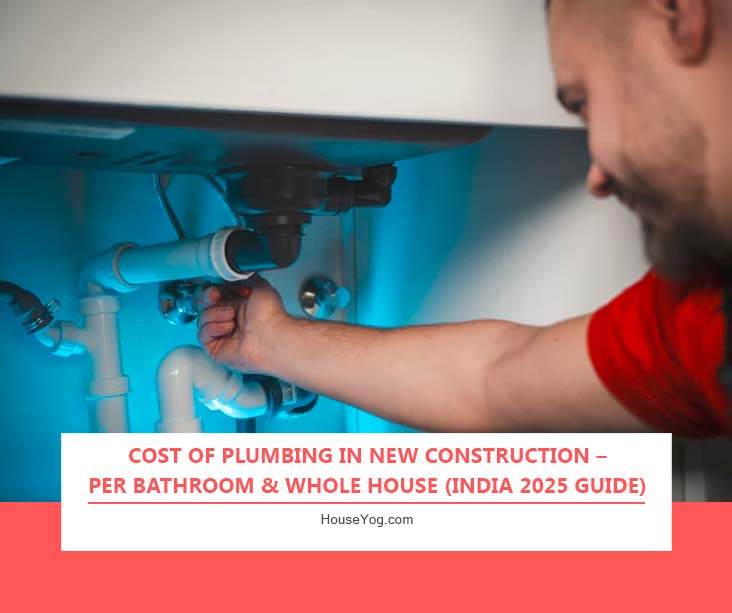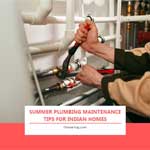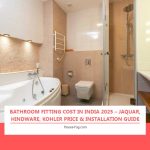Planning a New House? Estimating the costs of plumbing can be puzzling.
When building a new house in India, most homeowners focus on visible finishes such as tiles, wall paints and furniture. But, one of the most critical (and expensive!) hidden components is often ignored, i.e. plumbing.
Whether it’s ensuring a leak-free bathroom or setting up proper drainage for the kitchen, plumbing is foundational. And if you’re wondering about the plumbing cost for a new house in India, this detailed guide has you covered.
We’ll break down per-bathroom costs, whole-house estimates, materials, labour charges, and other key factors that impact plumbing costs.
2026 Update: Plumbing material and labour costs have increased moderately compared to previous years due to rising input prices and skilled labour demand. The estimates below reflect the average 2026 on-site rates across Indian cities.
Plumbing Cost for New House in India (Quick Overview)
Here’s a snapshot of typical plumbing costs for new house construction in India, including per bathroom rates, kitchen plumbing, and full-house estimates. These ballpark figures will help you plan your budget more effectively.
The following table gives a high-level cost snapshot before we dive into detailed per-bathroom and full-house plumbing breakdowns.
| Area of Work | Estimated Cost (Rs.) -2026 |
| Plumbing per Bathroom | Rs. 22,000 – Rs. 38,000 |
| Kitchen Sink Plumbing | Rs. 4,000 – Rs. 7,000 |
| Overhead/Underground Tank | Rs. 10,000 – Rs. 18,000 |
| Complete House Plumbing (2BHK – 3BHK) | Rs. 75,000 – Rs. 1,50,000+ |
| Labour Charges (per point) | Rs. 360 – Rs. 600 per point |
Please note that these are indicative prices for 2026 to get a ballpark idea for budgeting. Actual costs may vary based on location, material choice, design complexity, and contractor.
Plumbing Cost Per Bathroom in India
Bathroom plumbing accounts for a significant portion of the overall plumbing cost in a new home. It includes both water supply and drainage systems for fittings like:
- Washbasin
- WC (western commode)
- Shower area
- Geyser
- Floor trap and grating
- Health faucet/bidet spray
Estimated Cost Breakdown
Wondering how much it costs to set up plumbing in a new bathroom? Here’s a detailed look at the bathroom plumbing cost in India, including material, labour, and installation expenses.
| Component | Approx. Cost (Rs.) |
| Waterline & Drainage Pipes | Rs. 4,000 – Rs. 8,000 |
| Labour (6-10 points) | Rs. 3,000 – Rs. 7,000 |
| Fittings Installation | Rs. 5,000 – Rs. 10,000 |
| Accessories & Connectors | Rs. 3,500 – Rs. 6,000 |
| Total per Bathroom | Rs. 22,000 – Rs. 38,000 |
These estimates assume standard concealed plumbing using CPVC/PPR pipes for a typical residential bathroom. Premium fittings or complex layouts may increase costs.
Bathroom plumbing costs can vary depending on the number of plumbing points, pipe material used, wall thickness, and whether the plumbing is concealed or exposed. Homes in metro cities may also see slightly higher labour charges.
Pro Tip: Always install floor traps with proper slope for quick drainage and ensure correct hot–cold line separation to avoid pressure imbalance and future leakage issues.
Complete Plumbing Cost for Whole House
Planning plumbing for an entire home involves:
- Bathrooms (typically 2 or 3)
- Kitchen sink
- Utility area
- Water tank (overhead & underground)
- Water supply inlet and drainage outlet
- Pump connection (if needed)
- Terrace or balcony rainwater outlet
For a typical 2BHK or 3BHK independent house of 1000-1500 sq ft, the total plumbing cost can range from Rs. 75,000 to Rs. 1,50,000+ in 2026. This estimate includes internal water supply lines, drainage piping, labour, basic accessories, and tank connections, but excludes premium sanitary fittings.
Prices could vary depending on:
- Number of bathrooms & wet areas
- Type of fittings and materials used
- Labour rates in your city or region
- Complexity of the piping network
In 2026, homes opting for pressure pumps, multiple geysers, or additional utility points may see higher overall plumbing costs.
Important tip: Always finalise the plumbing layout during the planning stage so that concealed piping, shaft locations, and proper drainage slopes are built into the structure.
Factors Affecting Plumbing Cost in New Construction
The plumbing cost for a new house in India can vary widely based on several practical factors, from material choice to labour charges.
Here’s what directly impacts your overall plumbing budget.
1. Type & Quality of Materials
Your choice of pipes, fittings, and fixtures can significantly impact cost.
| Material | Cost Range (Rs. per metre) | Remarks |
| CPVC Pipes | Rs. 40 – Rs. 90 | Popular for hot/cold water |
| UPVC Pipes | Rs. 30 – Rs. 65 | Used for drainage lines |
| PPR Pipes | Rs. 55 – Rs. 100 | Higher durability, costlier |
| GI Pipes | Rs. 100 – Rs. 180 | Rust-prone, rarely used now |
Fittings (elbows, tees, unions) can add 20-25% to pipe cost.
2. Labour Charges
Labour charges are usually calculated per plumbing point (1 point = 1 water outlet or inlet).
- Plumbing rate per point: Rs. 450 – Rs. 750, depending on the region
- Higher rates apply for concealed or vertical installations
- Complex bathrooms with geysers, mixers, and diverters may require more points and higher charges
In 2026, skilled plumbing labour costs have increased due to higher demand for concealed and multi-bathroom installations.
Need trusted plumbers? Explore Houseyog’s verified service partners in your city.
3. Number of Bathrooms & Wet Areas
Each additional bathroom or utility area increases not only material cost but also labour points, testing time, and future maintenance responsibility. More wet areas = more piping, points, and fittings.
For example:
- 2 BHK with 2 bathrooms = ~18-22 plumbing points
- 3 BHK with 3 bathrooms + utility = ~30-35 points
Plan accordingly to manage costs and avoid overspending on unplanned extensions.
4. Brand of Materials Used
Just like tiles or paints, the brand of plumbing pipes and fittings can significantly influence your total plumbing cost. Top brands like Supreme, Astral, Prince, Aashirwad, Finolex, and Prayag are known for their durability, ISI certification, and after-sales support. But, they also come at a premium compared to local or unbranded products.
While local brands may save you a few rupees per metre, they often compromise on pressure resistance and long-term reliability, which can lead to leakage issues or early replacement needs.
Pro Tip: Always choose ISI-marked pipes and trusted brands for concealed plumbing systems.
5. Type of Plumbing System (Concealed vs Exposed)
- Concealed plumbing (pipes inside walls/floor) looks cleaner, but adds to labour and material cost
- Exposed plumbing is cheaper but less aesthetically appealing, and is used mostly in utility or budget projects
Concealed plumbing is the norm in most urban homes today and is preferred for long-term durability and aesthetics.
Plumbing for Kitchen & Utility Area
While kitchen and utility plumbing may seem simpler than bathrooms, they’re just as important for everyday functionality. Here’s a quick cost breakdown and what’s typically included in kitchen plumbing for new homes in India.
| Area | Average Cost (Rs.) |
| Kitchen Sink | Rs. 4,000 – Rs. 7,000 |
| Utility Wash Area | Rs. 3,000 – Rs. 6,000 |
| Water Purifier Line | Rs. 1,500 – Rs. 3,000 |
This includes:
- Sink tap and waste outlet
- Water inlet for RO or dishwasher
- Drain for the washing machine
These costs cover basic plumbing lines and connections and do not include sink fixtures, modular kitchen fittings, or appliances.
Don’t forget to provide a proper floor slope in the kitchen and utility areas to prevent water stagnation and long-term seepage issues.
Real-Life Scenario: 3BHK Plumbing Estimate
To help you understand the plumbing cost for a new house in India, here’s a practical example based on a typical 3BHK layout. This will give you a ballpark idea of how the costs add up across different areas.
Let’s say you’re building a 3BHK house with:
- 3 bathrooms
- 1 kitchen
- 1 utility area
- Overhead + underground tank setup
Rough Plumbing Cost Estimate for a 3 BHK house
Here’s a simplified cost table outlining the major components of plumbing expenses in a 3BHK new house, based on typical mid-range materials and fittings.
| Item | Cost (Rs.) |
| Bathrooms (3 x Rs. 25,000 – 30,000) | Rs.75,000 – Rs. 90,000 |
| Kitchen + Utility | Rs. 12,000 – Rs. 15,000 |
| Water Tanks & Pumps | Rs. 18,000 – Rs. 25,000 |
| Miscellaneous (grouting, valves) | Rs. 7,000 – Rs 12,000 |
| Total Estimate | Rs.1,15,000 – Rs.1,45,000 |
Common Plumbing Mistakes to Avoid
Avoiding these mistakes can save you thousands in repairs or rework later:
- Skipping pressure testing before plastering leads to hidden leaks
- Using low-quality joints or elbows often causes water seepage
- Improper slope in drainage lines results in water backflow or slow draining
- No floor trap in utility areas or balconies invites clogging and foul smells
- Overlooking the geyser or filter water lines leads to last-minute pipe breakage
Houseyog Tip: Always work with licensed plumbers and ask for a pressure test report before plastering begins.
Key Takeaways
- Plumbing cost for a new house in India ranges from Rs. 75,000 to Rs. 1.5 lakh or more, depending on size and standard of fittings
- Per bathroom cost: Rs. 18,000 – Rs. 30,000
- Material quality and type (CPVC, PPR) influence long-term durability and pricing
- Labour is charged per point, around Rs. 400 to Rs. 800/point
- Concealed systems look better but cost more
Also read: Complete Cost Guide to House Construction in India
Plumbing Checklist for New Homeowners
Use this simple checklist to stay on top of your plumbing plan:
- Finalise bathroom and kitchen layouts
- Choose between CPVC, UPVC, or PPR pipes
- Select trusted brands (ISI-marked)
- Plan for all plumbing points (bathrooms, kitchen, utility, balcony)
- Ensure proper drainage slope and floor traps in wet areas
- Discuss hot/cold water line placement with the plumber
- Include provisions for a geyser, washing machine, RO, etc.
- Confirm concealed vs exposed piping strategy
- Ask for rough and final plumbing testing reports
- Get a detailed material + labour quote in writing
Need a Custom Plumbing Estimate?
Building your dream home and want a detailed, site-specific plumbing quote?
Contact Houseyog now to receive expert assistance with plumbing layout design, labour estimation, and material suggestions to estimate the near-accurate cost today!
Also, don’t forget to share this post with someone building a house, it could save them time and money!
Frequently Asked Questions (FAQs)
Plumbing work includes the full piping system for water supply, drainage, and waste disposal, as well as the installation of fittings like taps, geysers, tanks, floor traps, and valves. It covers both internal (concealed/exposed) and external piping, from the overhead tank to the kitchen, bathrooms, and utility points.
While a typical 2BHK home typically has 15 – 20 plumbing points, a 3BHK with 3 bathrooms and a utility can have up to 25 – 30 points. Each point includes a water outlet/inlet, such as basin taps, shower, WC flush, geyser, or kitchen sink connections.
Yes, you can. But it’s not recommended. While local pipes may reduce upfront costs by Rs 5 – 10 per metre, they often lack durability, pressure rating, and quality control. This can lead to leaks, joint failures, or even full system replacements later. Therefore, always go for ISI-marked pipes from trusted brands like Supreme, Astral, or Prince.
Both are good, but it depends on your needs. CPVC pipes are widely used; they are cost-effective, easy to install, and suitable for both hot/cold water supply. PPR pipes are much stronger and more durable in high-pressure systems, but slightly costlier. For most residential homes in India, CPVC is a sufficient and popular choice.
For a typical 2BHK or 3BHK home, the plumbing work (rough + final) takes about 10-15 working days, depending on site readiness, design complexity, and the number of bathrooms or wet areas.






